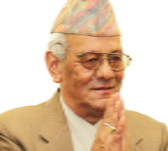
Back লোকেন্দ্র বাহাদুর চন্দ Bengali/Bangla Lokendra Bahadur Chand German लोकेन्द्र बहादुर चन्द DTY لکندرا بهادور چاند Persian Lokendra Bahadur Chand Finnish Lokendra Bahadur Chand French लोकेन्द्र बहादुर चन्द Hindi Lokendra Bahadur Chand IO Lokendra Bahadur Chand Italian ロケンドラ・バハドゥル・チャンダ Japanese
Lokendra Bahadur Chand | |
|---|---|
| लोकेन्द्र बहादुर चन्द | |
 | |
| 27th Prime Minister of Nepal | |
| In office 11 October 2002 – 5 June 2003 | |
| Preceded by | Sher Bahadur Deuba |
| Succeeded by | Surya Bahadur Thapa |
| In office 12 March 1997 – 7 October 1997 | |
| Preceded by | Sher Bahadur Deuba |
| Succeeded by | Surya Bahadur Thapa |
| In office 6 April 1990 – 19 April 1990 | |
| Preceded by | Marich Man Singh Shrestha |
| Succeeded by | Krishna Prasad Bhattarai |
| In office 12 July 1983 – 21 March 1986 | |
| Preceded by | Surya Bahadur Thapa |
| Succeeded by | Nagendra Prasad Rijal |
| Personal details | |
| Born | February 15, 1940 Kurkutiya Village, Baitadi District, Nepal |
| Political party | Rashtriya Prajatantra Party |
Lokendra Bahadur Chand (Nepali: लोकेन्द्र बहादुर चन्द born 15 February 1940) was the 27th prime minister of Nepal four times: from 1983 to 1986, briefly during April 1990, briefly during 1997 and from October 2002 until June 2003.[1][2] He is also involved in literature and have won a Madan Puraskar for his book Bisarjan in 2054 B.S.
Chand was born in Kurkutiya Village, Baitadi District, Nepal in 1940.[3] He is a major supporter of the Nepalese monarchy. He served as the speaker of Rastriya Panchayat. During his first two terms as prime minister, he did not belong to any political party, but by 1997 he was a member of his current political party, the conservative Rashtriya Prajatantra Party (RPP). He became Prime Minister on October 11, 2002, a week after the king launched a coup against the Nepali Congress government of Sher Bahadur Deuba. Chand was the head of the 2002 cabinet. Chand was forced to resign in 2003 after massive protests and an intensification of the civil war with Maoist rebels.
Ahead of the 2008 Constituent Assembly election, Chand is the top candidate of RPP for the closed proportional representation list.[4]
He has four sons and three daughters. His son Jayant Chand is in politics and became Minister twice and is active in his father's party.
- ^ "Lokendra Bahadur Chand, former chairman of the National Assembly,..." UPI. Retrieved 2022-12-09.
- ^ "Left-right-left-right". Himal Southasian. 1997-05-01. Retrieved 2022-12-09.
- ^ Group, Gale (1 January 2003). Worldmark Encyclopedia of the Nations. Gale Group. ISBN 9780787673376. Retrieved 1 August 2016 – via Google Books.
{{cite book}}:|last=has generic name (help) - ^ "Ca Election report". Archived from the original on 3 March 2016. Retrieved 1 August 2016.